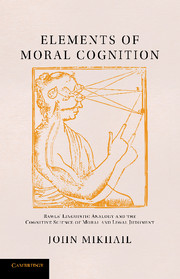 Elements of Moral Cognition
Elements of Moral Cognition PART TWO - EMPIRICAL ADEQUACY
Published online by Cambridge University Press: 07 September 2011
Summary
Two things fill the mind with ever new and increasing wonder and awe, the oftener and more steadily we reflect on them: the starry heavens above me and the moral law within me. … But though wonder and respect can indeed excite to inquiry, they cannot supply the want of it. What, then, is to be done in order to set inquiry on foot in a useful way appropriate to the sublimity of its objects? Examples may serve for warnings here, but also for imitation. The observation of the world began from the noblest spectacle that was ever placed before the human senses and that our understanding can undertake to follow in its vast expanse, and it ended in – astrology. Morals began with the noblest attribute of human nature, the development and cultivation of which promised infinite utility, and it ended in – fanaticism or superstition. So it goes with all crude attempts in which the principal part of the business depends on the use of reason, a use which does not come of itself, like that of the feet, from frequent exercise, especially when it concerns attributes which cannot be so directly exhibited in common experience. Though late, when the maxim did come into vogue of carefully examining every step which reason had to take and not to let it proceed except on the path of a well-considered method, the study of the structure of the world took an entirely different direction and therewith attained an incomparably happier result. […]
- Type
- Chapter
- Information
- Elements of Moral CognitionRawls' Linguistic Analogy and the Cognitive Science of Moral and Legal Judgment, pp. 75 - 76Publisher: Cambridge University PressPrint publication year: 2011


